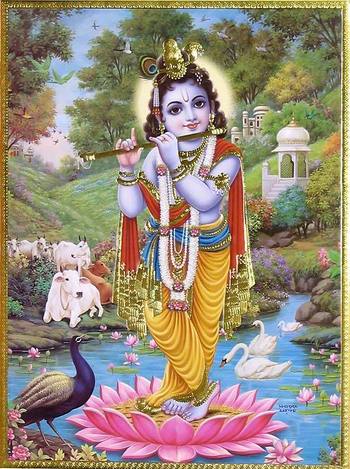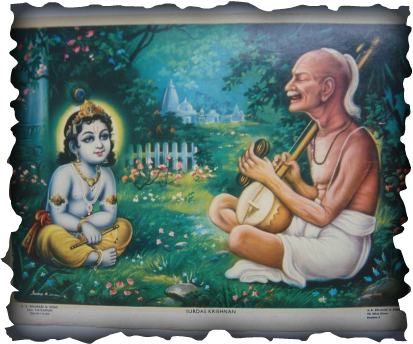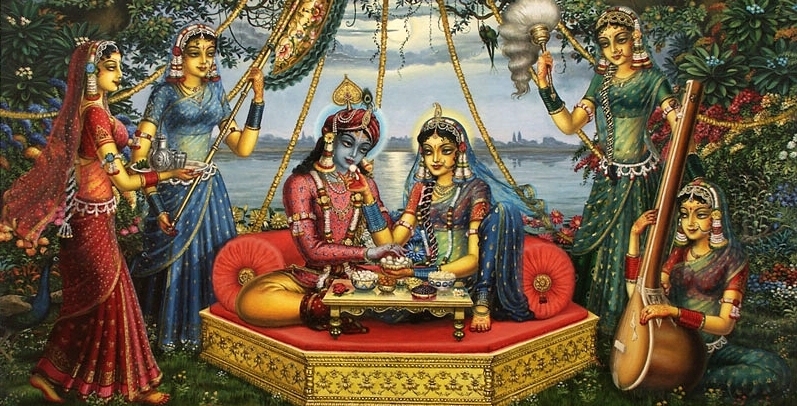Roopdhyan - Devotional Remembrance
Roopadhyan (रूपध्यान), loving remembrance of the Lord, is the science of devotional meditation emphasized by Jagadguru Shri Kripalu Ji Maharaj. Loving remembrance has been referred to in the scriptures and historic Saints by many terms such as dhyāna, smaraṇa, sumirana and others.
Shri Maharaj Ji clarified and simplified this practical science by first coining the word "roopadhyan". Roopa means form and dhyan means meditation. The word roopdhyan indicates directing of one's feelings towards one of the divine forms of God. This focus or remembrance alone is the practice of devotion.
As the Vedas explain, there are only three entities that exist: the individual souls, God and Maya (or the material world). Apart from us (souls), there are God and Māyā. Either we can direct our feelings towards God or towards the material world, which is the manifestation of Māyā. If we are not focusing on God's form, then we are by default focusing on a sentient or insentient aspect of the world.
To clarify the nature of God's form, the Vedas say,
Shri Maharaj Ji clarified and simplified this practical science by first coining the word "roopadhyan". Roopa means form and dhyan means meditation. The word roopdhyan indicates directing of one's feelings towards one of the divine forms of God. This focus or remembrance alone is the practice of devotion.
As the Vedas explain, there are only three entities that exist: the individual souls, God and Maya (or the material world). Apart from us (souls), there are God and Māyā. Either we can direct our feelings towards God or towards the material world, which is the manifestation of Māyā. If we are not focusing on God's form, then we are by default focusing on a sentient or insentient aspect of the world.
To clarify the nature of God's form, the Vedas say,
द्वेवाव ब्रह्मणो रूपे मूर्तं चैवामूर्तं च ।
"dvevāva brahmaṇo rūpe mūrtaṃ caivāmūrtaṃ ca"
"dvevāva brahmaṇo rūpe mūrtaṃ caivāmūrtaṃ ca"
There are two main aspects of God: His tangible form (sākāra) and His abstract or formless aspect (nirākāra). It is impossible to focus one's feelings on an abstraction or something with no form at all. Hence, those who do not believe in descensions of God and prefer the formless aspect of God, may imagine any symbol to represent God such as a dot of light, the mantra aum(ऊँ), and so on.
If you believe in God's descensions, choose one of these forms of God who will be your worshiped beloved Lord. Then choose a picture of the Lord that you really like. Look at that picture every day with a firm faith that, "this is the divine form of my beloved Lord". As you continue to focus your mind on the divine form of The Lord using your chosen picture, the image of God will create a deep impression on your mind. With consistent practice, you will be able to remember God at all times.
If you believe in God's descensions, choose one of these forms of God who will be your worshiped beloved Lord. Then choose a picture of the Lord that you really like. Look at that picture every day with a firm faith that, "this is the divine form of my beloved Lord". As you continue to focus your mind on the divine form of The Lord using your chosen picture, the image of God will create a deep impression on your mind. With consistent practice, you will be able to remember God at all times.

Whenever you sit to worship, close your eyes and feel the presence of that same form of God. Feel He is appearing in His most beautiful live divine form before you. Feel He is looking at you, smiling, walking, dancing or playing with you. Enjoy the nectar of His beauty as you gaze at Him from head to toe.
For instance, if you are remembering Shri Krishna, admire the splendor of His magnificent crown, curly locks, the tilak on forehead, His red lips, chin, blue cheeks and yellow silken shawl draped from His shoulders to his knees, His beautiful fragrant flower garland and His most attractive lotus feet adorned with anklets. Sense the fragrance of His divine body, His garland with leaves of perfumed Tulasi and other aromatic flowers and so on. When you are engaged in household work, feel you are cooking food for Him, cleaning the home for His visit, working in the office to earn money for His service and so on. Thus one can remain engaged in devotional thoughts of Shri Krishna for hours and hours. This is real practice of devotion. In the absence of this practice, even through your body might be engaged in physical worship activities (such as counting beads, chanting, reading or reciting scriptures, etc.) your mind will still be engaged in the world of Maya. That is not devotion.
Although, this practice of roopadhyana is not easy in the beginning, it is quite possible after some practice. Shri Krishna said to Arjuna,
For instance, if you are remembering Shri Krishna, admire the splendor of His magnificent crown, curly locks, the tilak on forehead, His red lips, chin, blue cheeks and yellow silken shawl draped from His shoulders to his knees, His beautiful fragrant flower garland and His most attractive lotus feet adorned with anklets. Sense the fragrance of His divine body, His garland with leaves of perfumed Tulasi and other aromatic flowers and so on. When you are engaged in household work, feel you are cooking food for Him, cleaning the home for His visit, working in the office to earn money for His service and so on. Thus one can remain engaged in devotional thoughts of Shri Krishna for hours and hours. This is real practice of devotion. In the absence of this practice, even through your body might be engaged in physical worship activities (such as counting beads, chanting, reading or reciting scriptures, etc.) your mind will still be engaged in the world of Maya. That is not devotion.
Although, this practice of roopadhyana is not easy in the beginning, it is quite possible after some practice. Shri Krishna said to Arjuna,
अभ्यासेन तु कौन्तेय ! वैराग्येण च गृह्यते ।
"abhyāsena tu kaunteya ! vairagyeṇa ca gṛhyate"
"abhyāsena tu kaunteya ! vairagyeṇa ca gṛhyate"
"Oh, Arjuna, it is possible through practice and renunciation."

It may seem that devotional remembrance is just imagination, but the supreme Lord who you are imagining is omniscient, and seated in your heart, noticing your each and every thought. He will bestow His grace according to the intensity of your sentiments of devotion. Gradually, due to His remembrance, your mind will become more purified, you may feel more attached to God. One day, upon the complete purification of your mind, by the grace of your Spiritual Master, your mind will become divine and you will see God, be freed from the bondage of Maya forever and attain divine bliss.
The mind, which is main performer of action, is wandering constantly in the material world. We have to attach our mind to God not the senses. Roopadhyan is compulsory to accomplish this,
The mind, which is main performer of action, is wandering constantly in the material world. We have to attach our mind to God not the senses. Roopadhyan is compulsory to accomplish this,
मन एव मनुष्याणां कारणं बन्ध मोक्षयो: ।
"mana eva manuṣyāṇāṃ kāraṇaṃ bandha mokṣayoḥ"
"mana eva manuṣyāṇāṃ kāraṇaṃ bandha mokṣayoḥ"
This means that the mind alone is the cause of our bondage or liberation. The senses perform their respective actions only according to the guidance of the mind. So roopadhyan is the most vital part of devotion. Bringing the form of your beloved God into your heart through loving remembrance is the same as bringing the unfathomable ocean of bliss into your heart. Your singular aim is to attain bliss. Through roopadhyan, you may fulfill this ultimate goal.
To learn more about the science and practice of roopadhyan, please read, "Prem Ras Siddhant" (The Philosophy of Divine Love) by Jagadguru Shri Kripalu Ji Maharaj.
To learn more about the science and practice of roopadhyan, please read, "Prem Ras Siddhant" (The Philosophy of Divine Love) by Jagadguru Shri Kripalu Ji Maharaj.


